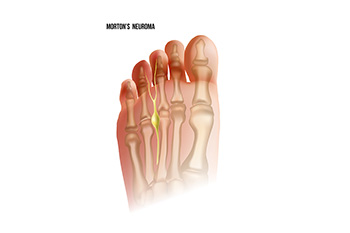

Morton's neuroma, a nerve condition that affects the ball of the foot, can bring about discomfort and pain. Its symptoms are often distinctive and can be recognized with attention to detail. Individuals with Morton's neuroma may experience a sharp, burning, or tingling pain that radiates from the ball of the foot, typically between the third and fourth toes. This discomfort often feels as if there is a small pebble or an object inside the shoe, causing an irritation. It tends to worsen with weight-bearing activities, such as walking or standing and may improve with rest. Wearing tight, constrictive footwear can exacerbate the symptoms, making shoe choices essential for managing the condition. Additionally, some individuals may feel numbness in the affected toes, contributing to a sense of discomfort and imbalance. Swelling or a palpable mass at the base of the toes is occasionally noticed. Early recognition of these common symptoms is essential for timely diagnosis and appropriate treatment of Morton's neuroma, helping individuals find relief from their foot discomfort. If you have pain in this part of your foot, it is strongly suggested that you schedule an appointment with a podiatrist. This type of doctor can accurately diagnose and treat Morton’s neuroma.
Morton’s neuroma is a very uncomfortable condition to live with. If you think you have Morton’s neuroma, contact Dr. Nooshin Zolfaghari of VIP Foot & Ankle Center. Our doctor will attend to all of your foot care needs and answer any of your related questions.
Morton’s Neuroma
Morton's neuroma is a painful foot condition that commonly affects the areas between the second and third or third and fourth toe, although other areas of the foot are also susceptible. Morton’s neuroma is caused by an inflamed nerve in the foot that is being squeezed and aggravated by surrounding bones.
What Increases the Chances of Having Morton’s Neuroma?
Morton’s neuroma is a very treatable condition. Orthotics and shoe inserts can often be used to alleviate the pain on the forefront of the feet. In more severe cases, corticosteroids can also be prescribed. In order to figure out the best treatment for your neuroma, it’s recommended to seek the care of a podiatrist who can diagnose your condition and provide different treatment options.
If you have any questions, please feel free to contact our office located in Pembroke Pines, FL . We offer the newest diagnostic and treatment technologies for all your foot care needs.